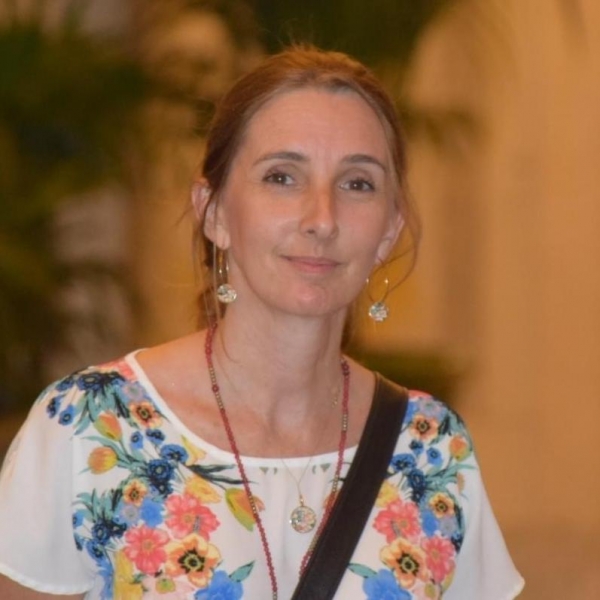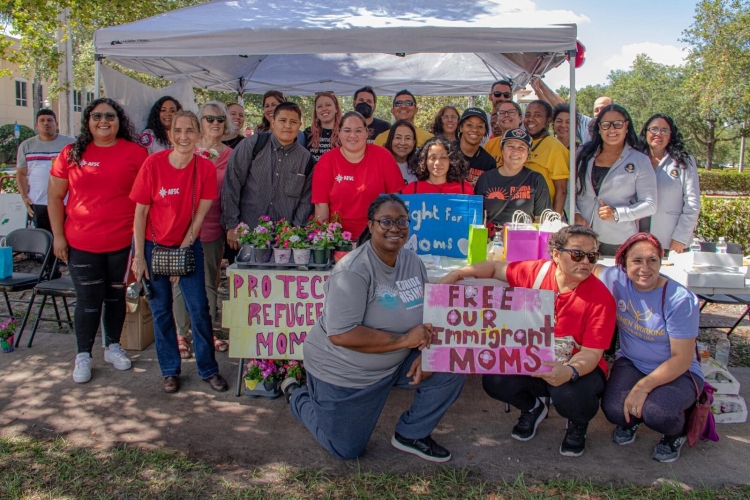
Community members with the Miramar Circle of Protection show love on Mother's Day for people waiting in front of the Miramar ICE office in South Florida. Photo: AFSC Florida
Every Wednesday—rain or shine—a coalition of community members gather outside the immigration office in Miramar, South Florida. We call our coalition the Miramar Circle of Protection. And we are there for the hundreds of immigrants who come to this facility every day to meet with Immigration and Customs Enforcement (ICE) officials.
These immigrants have come to the U.S. from Honduras, El Salvador, Haiti, Nicaragua, and other countries in Latin America and the Caribbean as well as all over the world. Many have fled violence, persecution, natural disasters, extreme poverty, and other horrific conditions—and are seeking safety and refuge. Others migrated to the U.S. years or even decades ago and are there for their regular check-ins with ICE.
Every one of these people should be treated with the compassion, dignity, and respect that we all deserve. But instead, many of them face mistreatment and abuse from staff—and inhumane conditions while waiting outside for their appointments.
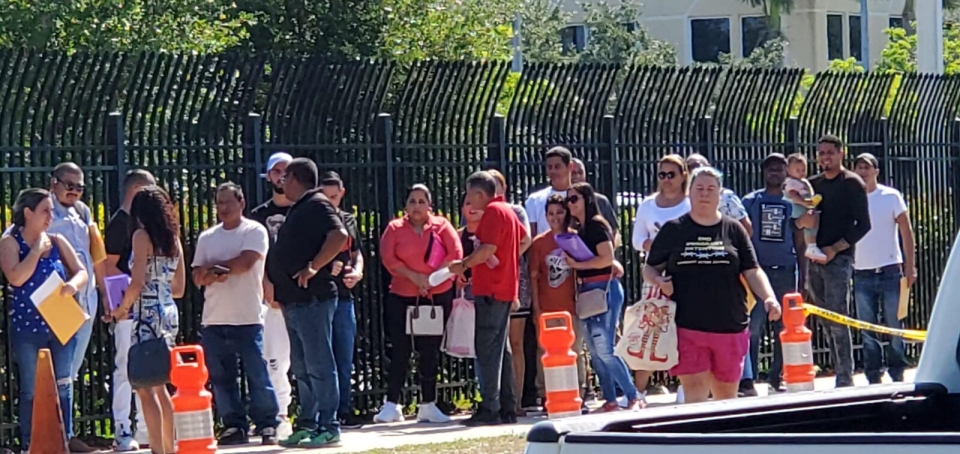
The Miramar facility is the only ICE processing center in South Florida, which means many immigrants travel hours to get there. People start lining up at 5 a.m. and will wait outside for hours—even in the scorching Florida heat. There is no access to water, toilets, or shade. Many have children with them. A few times this summer, an ambulance had to be called to help people experiencing heat-related illness while waiting.
Far too often, people who do get to speak with ICE staff don’t get the help they need. Some immigrants have faced verbal abuse—including racist comments and threats of deportation—from ICE officials. Many show up for their appointments only to be told that they have to reschedule, often months or even over a year later.
That includes people like Cristy, who arrived in the U.S. in March of this year. In 2018, Cristy’s political activism in Managua, Nicaragua made her a target for threats of physical violence from government supporters. In 2020, Hurricanes Eta and Oita hit the country, destroying her home and that of many others. Limited job opportunities in Nicaragua made it impossible for Cristy to rebuild and support her two young daughters. That’s why she migrated to the U.S. in April 2022.
When Cristy arrived in the U.S., she was told by immigration to report to the ICE office in Miramar. But when she went for a scheduled appointment, she was told by staff that they would not meet with her. Instead, she was only given a piece of paper with an ICE email address to contact. “I have no idea what I should do,” Cristy told us when we met her at the office that day.
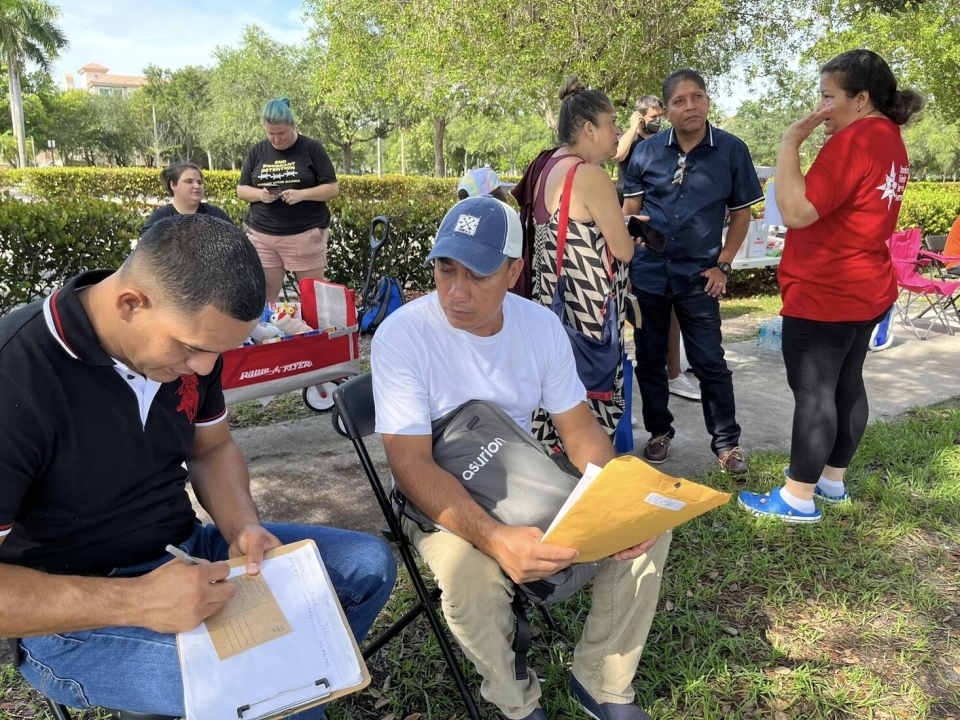
Our coalition has met countless people with stories like Cristy’s. Meanwhile, immigrant lives—and those of their families—remain in limbo as they wait months, even years to resolve their immigration case. For people who are undocumented, this uncertainty places them at greater risk for detention and deportation if they encounter law enforcement or immigration agents in their communities. It also makes it much harder for them to find work or housing and care for themselves and their families.
In 2017, community members created the Miramar Circle of Protection to support people facing these injustices at the Miramar ICE facility. Every Wednesday, we set up a large tent just across the street from the entrance of the ICE office. We have water, snacks, personal protective equipment, games for children, and chairs for people to sit in the shade. We provide them with information on navigating ICE proceedings and resources where they can get assistance with food, housing, and other services. And we create a safe space where people know they will be welcome, heard, and protected.
In recent months, the Miramar Circle of Protection has also provided opportunities for immigrants to engage in advocacy for more just, humane immigration policies. We started a campaign to help people write postcards to Florida elected officials and call for an expansion of Temporary Protected Status. The TPS program provides protection from deportation to people from certain countries afflicted by war, natural disaster, or other devastating events. Now the Biden administration must expand the program to protect people from more countries—and provide a pathway to citizenship for all immigrants in the U.S.
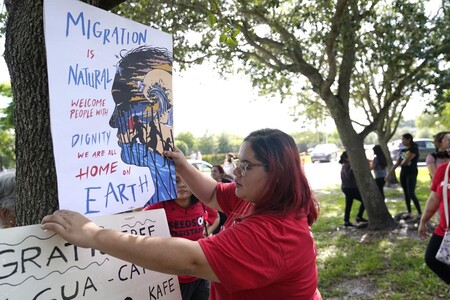
We’re also advocating to end ICE use of surveillance technologies, including ankle bracelets and phone tracking, to monitor people in immigration proceedings. These technologies amount to e-carceration that deprives people of their liberty. Instead, the U.S should invest in humane alternatives such as community-based case management for immigrants.
Our Miramar Circle of Protection is just one example of what it can look like when people come together to ensure every community member is welcome with dignity, respect, and compassion. And our coalition will continue to be there for people at Miramar as we push for a more just, humane future for all immigrants.
